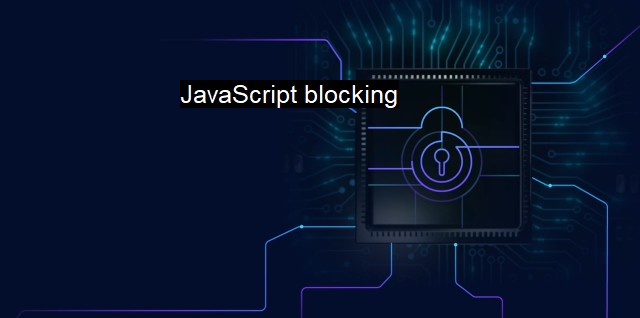What is JavaScript blocking?
Defending Against JavaScript Blocking Attacks: Understanding the Techniques and Causes for Effective Cybersecurity
JavaScript is an essential tool in today's internet landscape. It brings dynamic features to websites and allows for complex web interactions. the same power and flexibility make it an attractive vector for various kinds of cyber-attacks. One of such is known as "JavaScript blocking".JavaScript blocking is a method used by cybercriminals or cyber attackers to prevent the execution of JavaScript code on a user's browser. Nowadays, a significant number of user interactions on the web are powered by JavaScript to enhance usability and provide a user-friendly interface. when attackers implement JavaScript blocking, those interactive elements fail to load or stop functioning properly, potentially disrupting the seamless web browsing experience.
The purpose behind JavaScript blocking differs as the modus operandi of cyber-attackers varies. Some use it to impede the operation of other scripts that might prevent them from achieving their malicious interest; while others use it as a tool to modify the behaviour of a site or a web application by blocking certain JavaScript files. Attackers can insert malicious scripts that block the execution of valid JavaScript files, leading to the failure of specific components of a website.
It should be noted that cyber defences, like antivirus software, also use JavaScript blocking to enhance computer security. The primary reason for such an action is to prevent the execution of malicious JavaScript code that might be a security threat to a user. blocking JavaScript can prohibit exploit kits from taking advantage of vulnerabilities in a web application, thereby safeguarding user data and preserving integrity.
The JavaScript blocking technique used by antivirus software tends to work by scanning websites for possibly malicious pieces of JavaScript code. When such code is identified, the antivirus software disables or blocks the suspicious JavaScript from operating, thereby denying potential exploits access to the system.
It is essential to understand that JavaScript is a powerful tool with different possibilities, and there's no one-size-fits-all security system for it. Each user, based on their browsing habits and requirements, may need different levels of protection. From enabling complete blocking of JavaScript to encouraging selective blocking depending upon the reliability of the site, the configuration varies.
Though JavaScript blocking can protect users from certain cyber threats, it should not be seen as a stand-alone solution for online security. Just like other cybersecurity measures, JavaScript blocking also needs to go hand-in-hand with other protective measures like constantly updating one’s systems, using strong and unique passwords, being wary of suspicious emails and links, and only downloading trusted applications from official sources.
In overall browsers and JavaScript have moved a lot from when they were first implemented, becoming intricate components of the internet. Whereas JavaScript blocking might have been more effective in the past, new technologies, and evasion techniques used by cybercriminals might compromise its efficacy, and such threats must be continually evaluated.
JavaScript blocking, as a cybersecurity measure, holds a powerful, yet balanced potential. While on one hand it helps combat and restrict the execution of malicious scripts on the user's browser, it can also disrupt the optimal functioning of websites and web applications if not utilised correctly. Thus, understanding JavaScript blocking is crucial for any individual or organisation stressing on proper and comprehensive online security. It is a tool to be used wisely, and just like any tool, its efficacy lies in its judicious and appropriate application.

JavaScript blocking FAQs
What is JavaScript blocking?
JavaScript blocking is a security feature used in web browsers and antivirus software that prevents JavaScript code from executing on websites. This is done to protect against potential malvertising, phishing, and other cyberattacks that can exploit vulnerabilities in JavaScript code.Why do some anti-virus programs block JavaScript?
Some anti-virus programs block JavaScript because it is a common vector for malware and cyberattacks. Malicious code can be hidden in JavaScript files or executed using browser scripting, so blocking JavaScript can help prevent malware infections and other cyber threats.How can I tell if JavaScript is being blocked on my browser?
If JavaScript is being blocked on your browser, you may notice that some website features do not work as expected. Buttons may not function, menus may not drop down, or videos may not play. In some cases, the website may display an error message notifying you that JavaScript needs to be enabled.Can JavaScript blocking affect my browsing experience?
Yes, JavaScript blocking can affect your browsing experience. Websites that rely heavily on JavaScript may not function properly, resulting in a less-than-optimal user experience. However, the trade-off is increased security and protection against cyberattacks that exploit JavaScript vulnerabilities. As such, many users choose to enable JavaScript on a per-site basis, rather than all the time.| | A | | | B | | | C | | | D | | | E | | | F | | | G | | | H | | | I | | | J | | | K | | | L | | | M | |
| | N | | | O | | | P | | | Q | | | R | | | S | | | T | | | U | | | V | | | W | | | X | | | Y | | | Z | |
| | 1 | | | 2 | | | 3 | | | 4 | | | 7 | | | 8 | | |||||||